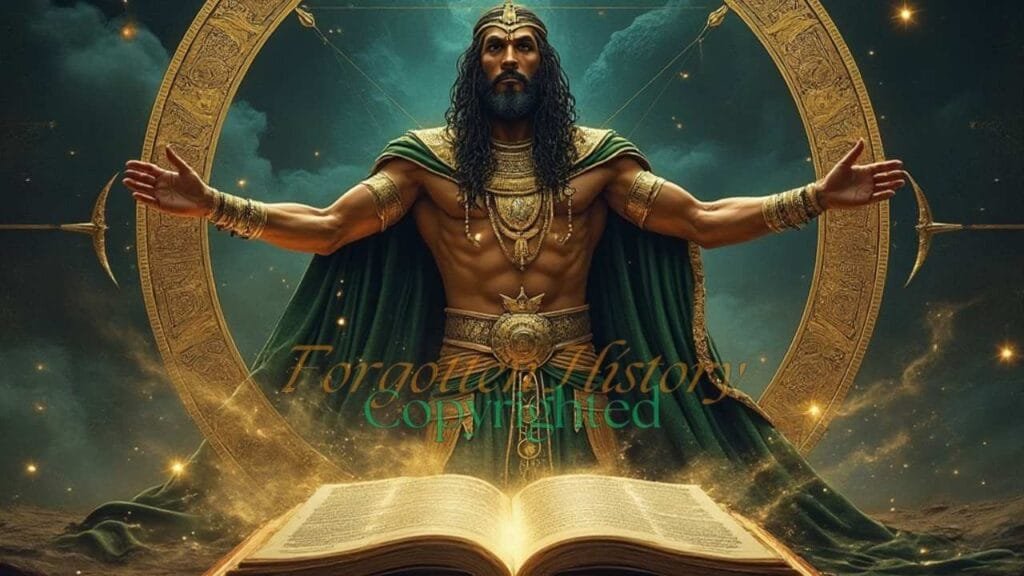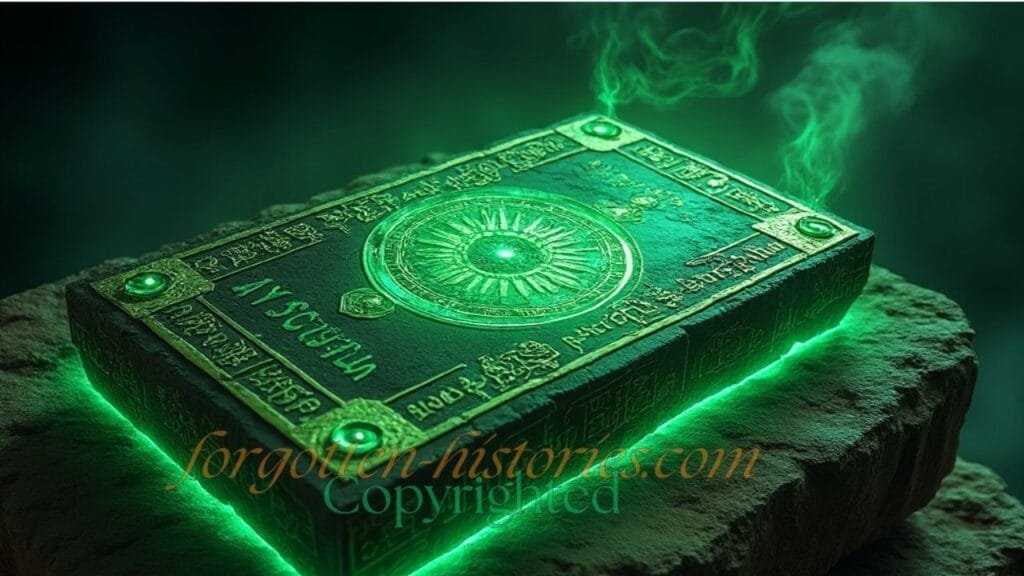Introduction: The Enigmatic Appeal of the Book of Thoth

What if a book could reveal the universe’s secrets? Ancient Egyptians believed in such a book. They called it the Book of Thoth. This book held divine knowledge and immense power. The myth says only Thoth, the god of wisdom, could safely use it. Thoth wasn’t just any god. He invented writing, recorded cosmic events, and understood universal forces. The Book of Thoth promised boundless wisdom but carried curses for those who sought it recklessly.
In this article, we explore the Book of Thoth, its mysteries, and its legacy. We examine why this book captivated ancient Egyptians and continues to intrigue people today. We also explore how Thoth’s teachings shaped Western mysticism and esotericism.
Thoth: God of Knowledge, Magic, and the Written Word

who was thoth? Thoth was a central figure in Egyptian spirituality. He governed wisdom, writing, and cosmic balance. Egyptians saw him as a teacher and protector of divine knowledge. Let’s look deeper at his role and significance.
Thoth’s Role in Egyptian Religion:
Thoth wasn’t just a scribe; he was also the moon god and keeper of Ma’at, the divine order. Thoth’s main role was to maintain balance. He helped in the afterlife, judging the souls of the dead. Thoth weighed souls against a feather to determine their fate.
Thoth’s Symbols and Depictions:
Egyptians depicted Thoth as an ibis-headed god or a baboon. The ibis symbolized intellect and thought, while baboons represented scribes. Thoth often held writing tools, signifying his connection to writing and divine knowledge. These symbols showed his power in both the divine and earthly realms.
Thoth as the Inventor of Writing:
Writing was sacred in Egypt. Thoth invented hieroglyphs, the sacred writing system. Egyptians believed Thoth taught humans to use writing to capture truth. This made scribes powerful figures. Without Thoth, language and knowledge would not have flourished.
The Book of Thoth: Myth, Magic, and Forbidden Knowledge

The Book of Thoth was no ordinary text. It held secrets that could change the world. According to legend, it could grant power over nature and even death. However, reading it came with dangers. Many who sought it suffered madness or death. Egyptians saw the book as a double-edged sword—both enlightening and dangerous.
Content of the Book:
Ancient texts suggest the Book of Thoth covered astronomy, medicine, rituals, and alchemy. The book supposedly held the “words of creation,” the sacred language that shaped reality. This knowledge gave people the power to change the world.
Warnings and Consequences:
Myths often warn about the consequences of misusing the book’s power. Some stories mention curses protecting it. The ancient Egyptians believed that knowledge was sacred and should not be exploited. Those who sought the book recklessly risked losing their sanity or even their lives.
Thoth’s Role in Forbidden Knowledge:
In Egyptian mythology, Thoth’s wisdom came with responsibility. The gods valued knowledge but knew it could disrupt cosmic order. Thoth was the guardian of this knowledge. He protected it from those unworthy of understanding it.
Key Texts Associated with the Book of Thoth
Several ancient texts claim to contain parts of Thoth’s teachings. Each text serves a different purpose, covering subjects like alchemy, astrology, and philosophy. Let’s explore the four most famous ones.
1. The 42 Books of Thoth

According to historian Manetho, Thoth wrote 42 sacred books. These books covered everything from medicine to rituals. Egyptians considered these texts the foundation of their wisdom. Priests and scholars guarded them in temple libraries, available only to the initiated.
- Content and Structure: Each book focused on a different subject. Some covered practical topics, like medicine. Others explored spiritual themes, like rituals or magic.
- Significance in Egypt: These books formed the backbone of Egyptian knowledge. Priests used them to guide practices and ensure the community stayed aligned with divine principles.
- Mythical Legacy: While Thoth wrote many texts, only 42 were sacred. This limited access made them even more powerful and respected.
2. The Emerald Tablet
The Emerald Tablet is one of the most famous texts linked to Thoth. According to legend, it contained secrets of alchemy. The tablet was supposedly discovered by Hermes Trismegistus, who merged Thoth’s identity with that of the Greek god Hermes.

- Content of the Tablet: The tablet described the process of alchemical transformation, both physical and spiritual. It guided practitioners on converting base metals into gold and achieving enlightenment.
- Influence on Alchemy: Alchemists regarded the tablet as a map for both material and spiritual transformation. Its influence spread throughout the mystical traditions of the West.
- Legacy: The Emerald Tablet continues to inspire those seeking spiritual and material transformation. Its message of unity between matter and spirit still resonates in modern esoteric practices.
3. The Hermetic Corpus
The Hermetic Corpus is a collection of writings attributed to Hermes Trismegistus, the fusion of Thoth and Hermes. These texts mix Egyptian mysticism with Greek philosophy and explore spiritual themes, ethics, and magic.
- Philosophical Content: The Hermetic Corpus discusses the relationship between humans, the cosmos, and divine wisdom. It emphasizes the power of knowledge to transform the individual and the world.
- Historical Context: The texts were written during the Roman period in Egypt. They represent the blending of Egyptian and Greek thought into a unified spiritual philosophy.
- Influence on Western Thought: The Hermetic Corpus influenced Renaissance scholars, alchemists, and philosophers. It helped lay the foundation for modern Western esotericism.
4. The Demotic Book of Thoth
The Demotic Book of Thoth is a text written in demotic script. It offers a rare glimpse into Egyptian spirituality during the Greco-Roman period. This book consists of a dialogue between Thoth and a seeker, guiding them through divine wisdom.
- Content and Format: The book is a conversation in which Thoth instructs the seeker in rituals, prophecies, and divine knowledge.
- Significance: This text shows that Thoth’s teachings continued to guide Egyptians even after the fall of their empire. It preserved the spiritual practices of the ancient world.
- Cultural Impact: The Demotic Book of Thoth demonstrates Thoth’s enduring role as a guide to divine knowledge and transformation.
Thoth’s Influence on Western Mysticism
Thoth’s influence extended beyond Egypt. As Hermes Trismegistus, Thoth became a key figure in Western mysticism. His teachings inspired Hermeticism, alchemy, and esoteric traditions.
- Hermeticism’s Impact on Renaissance Thought: Renaissance thinkers revived the Hermetic texts, believing they contained ancient wisdom. They saw Hermeticism as a way to unlock the mysteries of the universe.
- Alchemy and the Emerald Tablet: Alchemists viewed the Emerald Tablet as a guide to both material and spiritual transformation. It influenced their work for centuries, guiding them in the pursuit of knowledge and enlightenment.
- Thoth Tarot and Modern Mysticism: In the 20th century, occultist Aleister Crowley created the Thoth Tarot deck. This deck, inspired by Thoth’s wisdom, remains popular among modern practitioners of tarot and mysticism.
Forbidden Knowledge: The Double-Edged Sword
The Book of Thoth represents the universal theme of forbidden knowledge. Many cultures warn of the dangers of seeking knowledge that is too powerful. Thoth’s story reflects this danger.
- The Danger of Knowledge: The Book of Thoth shows that knowledge, while powerful, can be dangerous. It must be used responsibly. Thoth’s wisdom is both enlightening and risky.
- Comparative Myths: The Book of Thoth parallels other myths about forbidden knowledge, such as the story of Prometheus, who stole fire from the gods. These myths show the consequences of seeking power without understanding.
- Cosmic Balance in Egypt: In Egypt, knowledge was sacred. It could only be used by those who respected the balance of the universe. Thoth was the guardian of this balance, ensuring that wisdom did not disrupt the cosmic order.
Conclusion: The Enduring Mystery of the Book of Thoth
The Book of Thoth continues to fascinate people today. Its legend reflects humanity’s desire for knowledge and power. Yet, it also warns us of the responsibility that comes with understanding the mysteries of the universe. While the Book of Thoth may be lost to history, its legacy remains. Thoth’s teachings continue to inspire those who seek wisdom, balance, and enlightenment.